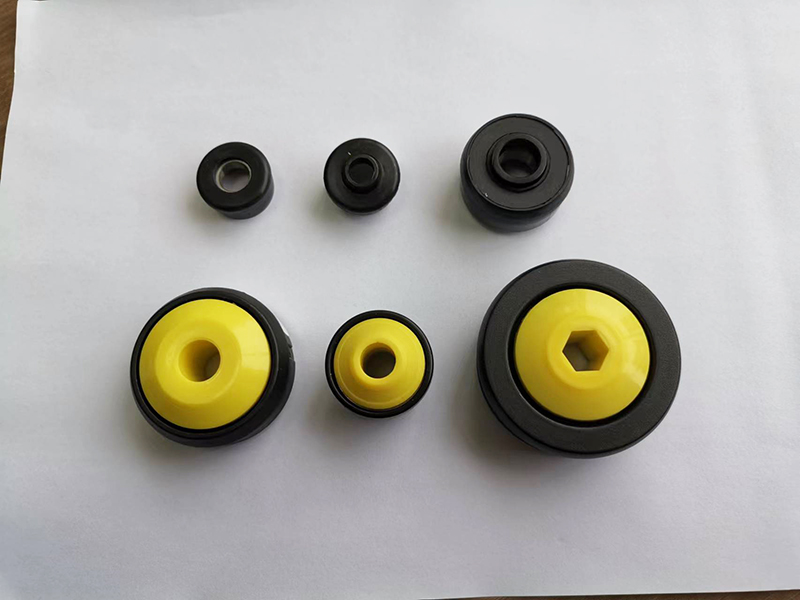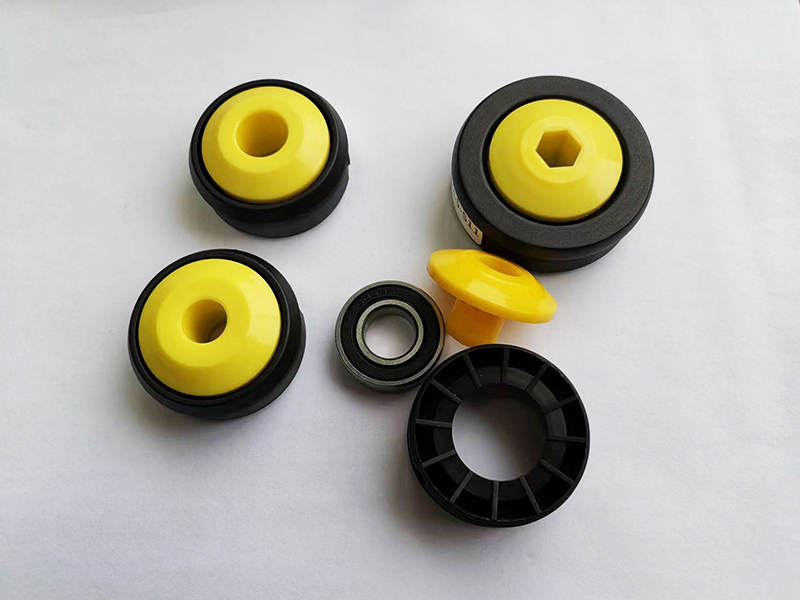
The Roller Bearing Plastic Housing Assembly is a core component used for assembling and supporting conveyor rollers. It is a pre-assembled, modular unit typically consisting of an engineering plastic injection-molded bearing housing and a built-in rolling bearing. Its core function is to act as the "joint" and "foot" of the roller, allowing it to rotate flexibly with low resistance while being securely mounted to the conveyor frame.
This assembly usually consists of the following parts:
Plastic Bearing Housing (Plastic Seat)
Material: Typically made from high-strength, wear-resistant, self-lubricating engineering plastics such as Nylon (PA66), Polyoxymethylene (POM/Delrin), Polypropylene (PP), or UPE (Ultra-high-molecular-weight polyethylene).
Structure: Designed with precise grooves or features to accurately and firmly snap into the inner wall of the roller tube. The exterior is designed with clips, spring tabs, or screw holes for mounting onto the conveyor frame.
Bearing
Ball Bearings: The most common type, offering good load capacity and higher rotational speeds; may require periodic lubrication.
Oil-impregnated Bearings / Sleeve Bearings: A self-lubricating type made from sintered powder metal or copper-based material; low cost and resistant to dust, but relatively lower in speed and load capacity, suitable for light-duty, low-speed applications.
Deep Groove Ball Bearings with Seals: Equipped with protective shields, effectively preventing dust ingress, extending service life, and often maintenance-free; this is the current mainstream choice.
The bearing, embedded within the plastic housing, is the core element ensuring smooth rotation. Based on application needs, the main types include:
Cover
A plastic cover is not only for nice appearance, but it is efficient to avoid dust or splash into the bearing.
Suitable Roller Inner Diameter: Must closely match the roller's inner diameter (e.g., Φ25, Φ32, Φ38mm, etc.).
Bearing Type: Choose ball bearings or oil-impregnated bearings based on load, speed, and operating environment.
Material: Select the appropriate plastic material based on the environment (e.g., humidity, chemical exposure, food-grade requirements).
Load Capacity: The radial load the assembly can withstand (i.e., pressure perpendicular to the shaft).
Operating Temperature: Both the engineering plastic and the bearing lubricant have specific applicable temperature ranges.
Mounting Style: Whether it's clip-on, spring-loaded press-fit, or screw-fixed, it must match the frame design.
Specifications as below


| Tube Out Diameter (mm) | Tube Thickness (mm) | Shaft Diameter (mm) | Material |
| Φ25 | 1.0 | Φ6 | nylon + PP |
| Φ32 | 1.2/1.5 | Φ8/Φ10 | nylon + PP |
| Φ38 | 1.2/1.5 | Φ10/Φ12/hex 11 | nylon + PP |
| Φ50 | 1.2/1.5/2.0 | Φ12/Φ15/hex 11 | nylon + PP |
| Φ60 | 1.2/1.5/2.0 | Φ12/Φ15/hex 11 | nylon + PP |
| Φ76 | 2.0/2.5/3.0 | Φ15/Φ20 | nylon + PP |
Easy Installation, High Efficiency: Utilizes a "press-fit" or "snap-in" installation method, requiring no complex tools. The assembly is simply pressed into both ends of the roller, significantly improving assembly efficiency.
Weight Reduction & Cost Saving: The plastic housing notably reduces weight and cost compared to all-metal bearing housings.
Corrosion Resistance & Chemical Resistance: Engineering plastics inherently offer good corrosion resistance, making them suitable for damp, chemical, or food-grade environments.
Vibration Damping & Noise Reduction: The plastic material provides some vibration absorption and noise reduction, resulting in quieter conveyor operation.
Self-Lubricating or Maintenance-Free: The self-lubricating properties of the plastic or the pre-sealed bearing design reduce the need for lubrication, lowering maintenance costs.
Prevents Metal-to-Metal Contact: The plastic housing contacts the roller's inner wall and the frame, avoiding direct metal-to-metal friction and the risk of seizing due to rust.

Fixation: The bearing housing assembly is pressed into both ends of the roller. A fixed metal shaft is then passed through the inner bore of the bearings in both assemblies.
Support: Both ends of the metal shaft are secured within the mounting holes or slots of the conveyor frame. At this point, the roller and the entire bearing housing assembly can rotate around the fixed shaft.
Rotation: When goods move over the roller, friction causes the roller to rotate. The roller drives its internal plastic housing and the outer ring of the bearing to rotate together around the fixed shaft and the bearing inner ring, thereby achieving low-resistance rolling conveyance.
This assembly is a standard component in almost all light to medium-duty roller conveyors, widely used in:
Packaging lines
Electronics assembly lines
Food and pharmaceutical conveying lines (where food-grade material is required)
Logistics sorting systems
Idler rollers for small belt conveyors

More Models

The Roller Bearing Plastic Housing Assembly is a seemingly simple yet crucial "connector." Through highly integrated and optimized material application, it enables the low-cost, high-efficiency assembly and stable, low-consumption operation of roller conveyor systems. It is an indispensable fundamental component in modern modular conveying equipment.

The Roller Bearing Plastic Housing Assembly is a core component used for assembling and supporting conveyor rollers. It is a pre-assembled, modular unit typically consisting of an engineering plastic injection-molded bearing housing and a built-in rolling bearing. Its core function is to act as the "joint" and "foot" of the roller, allowing it to rotate flexibly with low resistance while being securely mounted to the conveyor frame.
This assembly usually consists of the following parts:
Plastic Bearing Housing (Plastic Seat)
Material: Typically made from high-strength, wear-resistant, self-lubricating engineering plastics such as Nylon (PA66), Polyoxymethylene (POM/Delrin), Polypropylene (PP), or UPE (Ultra-high-molecular-weight polyethylene).
Structure: Designed with precise grooves or features to accurately and firmly snap into the inner wall of the roller tube. The exterior is designed with clips, spring tabs, or screw holes for mounting onto the conveyor frame.
Bearing
Ball Bearings: The most common type, offering good load capacity and higher rotational speeds; may require periodic lubrication.
Oil-impregnated Bearings / Sleeve Bearings: A self-lubricating type made from sintered powder metal or copper-based material; low cost and resistant to dust, but relatively lower in speed and load capacity, suitable for light-duty, low-speed applications.
Deep Groove Ball Bearings with Seals: Equipped with protective shields, effectively preventing dust ingress, extending service life, and often maintenance-free; this is the current mainstream choice.
The bearing, embedded within the plastic housing, is the core element ensuring smooth rotation. Based on application needs, the main types include:
Cover
A plastic cover is not only for nice appearance, but it is efficient to avoid dust or splash into the bearing.
Suitable Roller Inner Diameter: Must closely match the roller's inner diameter (e.g., Φ25, Φ32, Φ38mm, etc.).
Bearing Type: Choose ball bearings or oil-impregnated bearings based on load, speed, and operating environment.
Material: Select the appropriate plastic material based on the environment (e.g., humidity, chemical exposure, food-grade requirements).
Load Capacity: The radial load the assembly can withstand (i.e., pressure perpendicular to the shaft).
Operating Temperature: Both the engineering plastic and the bearing lubricant have specific applicable temperature ranges.
Mounting Style: Whether it's clip-on, spring-loaded press-fit, or screw-fixed, it must match the frame design.
Specifications as below


| Tube Out Diameter (mm) | Tube Thickness (mm) | Shaft Diameter (mm) | Material |
| Φ25 | 1.0 | Φ6 | nylon + PP |
| Φ32 | 1.2/1.5 | Φ8/Φ10 | nylon + PP |
| Φ38 | 1.2/1.5 | Φ10/Φ12/hex 11 | nylon + PP |
| Φ50 | 1.2/1.5/2.0 | Φ12/Φ15/hex 11 | nylon + PP |
| Φ60 | 1.2/1.5/2.0 | Φ12/Φ15/hex 11 | nylon + PP |
| Φ76 | 2.0/2.5/3.0 | Φ15/Φ20 | nylon + PP |
Easy Installation, High Efficiency: Utilizes a "press-fit" or "snap-in" installation method, requiring no complex tools. The assembly is simply pressed into both ends of the roller, significantly improving assembly efficiency.
Weight Reduction & Cost Saving: The plastic housing notably reduces weight and cost compared to all-metal bearing housings.
Corrosion Resistance & Chemical Resistance: Engineering plastics inherently offer good corrosion resistance, making them suitable for damp, chemical, or food-grade environments.
Vibration Damping & Noise Reduction: The plastic material provides some vibration absorption and noise reduction, resulting in quieter conveyor operation.
Self-Lubricating or Maintenance-Free: The self-lubricating properties of the plastic or the pre-sealed bearing design reduce the need for lubrication, lowering maintenance costs.
Prevents Metal-to-Metal Contact: The plastic housing contacts the roller's inner wall and the frame, avoiding direct metal-to-metal friction and the risk of seizing due to rust.

Fixation: The bearing housing assembly is pressed into both ends of the roller. A fixed metal shaft is then passed through the inner bore of the bearings in both assemblies.
Support: Both ends of the metal shaft are secured within the mounting holes or slots of the conveyor frame. At this point, the roller and the entire bearing housing assembly can rotate around the fixed shaft.
Rotation: When goods move over the roller, friction causes the roller to rotate. The roller drives its internal plastic housing and the outer ring of the bearing to rotate together around the fixed shaft and the bearing inner ring, thereby achieving low-resistance rolling conveyance.
This assembly is a standard component in almost all light to medium-duty roller conveyors, widely used in:
Packaging lines
Electronics assembly lines
Food and pharmaceutical conveying lines (where food-grade material is required)
Logistics sorting systems
Idler rollers for small belt conveyors

More Models

The Roller Bearing Plastic Housing Assembly is a seemingly simple yet crucial "connector." Through highly integrated and optimized material application, it enables the low-cost, high-efficiency assembly and stable, low-consumption operation of roller conveyor systems. It is an indispensable fundamental component in modern modular conveying equipment.